EduPath: Personalized Education Journey in Ghana
This blog post provides an update on the progress of the Next Generation Digital Action (NGDA) course. It was prepared by the YA-DK-2 team and focuses on Challenge 4 “Statistical Data to Promote Quality Education” by Ghana Statistical Services. We extend our gratitude to Ghana Statistical Service, Ministry of Education in Ghana, Danish Embassy in Ghana, and everyone who participated in our interviews, thank you all for your invaluable support in this project!
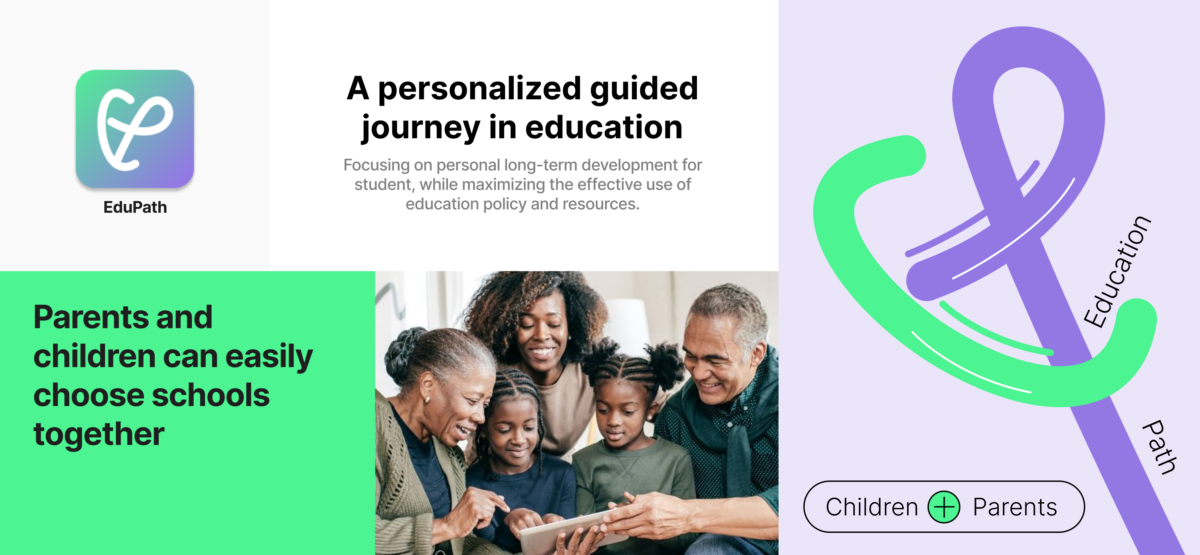
Problem
“… Most information is in silos …It’s basically an old school connection, and you need to go running in terms of getting information day by day, but most of the information really comes through word of mouth or specifically walking straight to a music education institution or going for some sort of educational seminar or workshop…”
When describing how to prepare for their children’s further education, Ghanaian parents use the word ‘Silos‘ to describe the current “information system”. Because it not only takes a lot of time and energy for parents to collect information, but is also more based on the experience of friends or colleagues. “Is their advice really suitable for my child” is also a concern of parents. With data and the internet highly accessible today, how can we make this process easier and more personalized?

With this question, we further interviewed Ghanaian students who had just finished their undergraduate studies and were completing their master’s programs to understand the way they chose schools in the past.
“…generally in a certain culture, it is such that parents are always right, as we just follow what our parents are saying” In the school selection process, the child’s involvement seems to depend on the parent’s authority. When talking about choosing a university, the interviewer mentioned “I prefer the software aspect of things, so I was told to choose Computer Science, but dealing with that, it’s not like just the theory aspect,you want to get the real answer, practical”. Students, especially high school students, are eager to learn more about their future majors or careers, but the resources they have access to are limited, and there is a lack of exposure to different fields in basic education and high school.
As the interview progressed, we seemed to be getting closer and closer to the real problem! Starting from the challenge of school selection, we saw that Ghanaian parents and children played a fluid and active role at different stages of education. In the basic education stage (6 years of primary school and 3 years of junior high school), parents were mainly responsible for screening and analyzing school information. While in high school, children had more curiosity for future majors and career choices and took the initiative in school selection. School selection is a microcosm of parents and children working together for a better future. Based on this, a problem definition took shape:
How might we create a systematic solution with a digitized platform that optimizes the school selection process for personal long-term development, while making the best use of education policy and resources in Ghana?
Solution
EduPath: Unlocking Infinite Learning Possibilities
We developed a multi-platform app specifically to solve these problems for parents and students. Our app is called EduPath. The app helps parents and children in Ghana who want to make informed and personalized school and career choices. By providing real-time education policies, school information, and direct access to career guidance, instead of information silos, our app integrates all the information parents and children need in one place. EduPath integrates the latest data from the government, society, and universities, making the school selection and career planning process smoother and more personalized.
Now let’s explore the journey of EduPath. Parents will receive notifications directly from schools and can download the EduPath app. From Junior High School, parents can get the latest national education policies, news, and browse the school informations, helping them understand the education system better.
When students reach Senior High School, student will have their own version of the app. This version allows them to explore schools and career paths that match their personal interests and abilities. They also get the opportunity to connect with university tutors, who can share their insights on school selection and long-term career planning.
As students enter tertiary education, their journey with EduPath doesn’t end. They will receive an invitation from our app to apply to become a tutor and there are chances to make a positive impact on the younger generation.
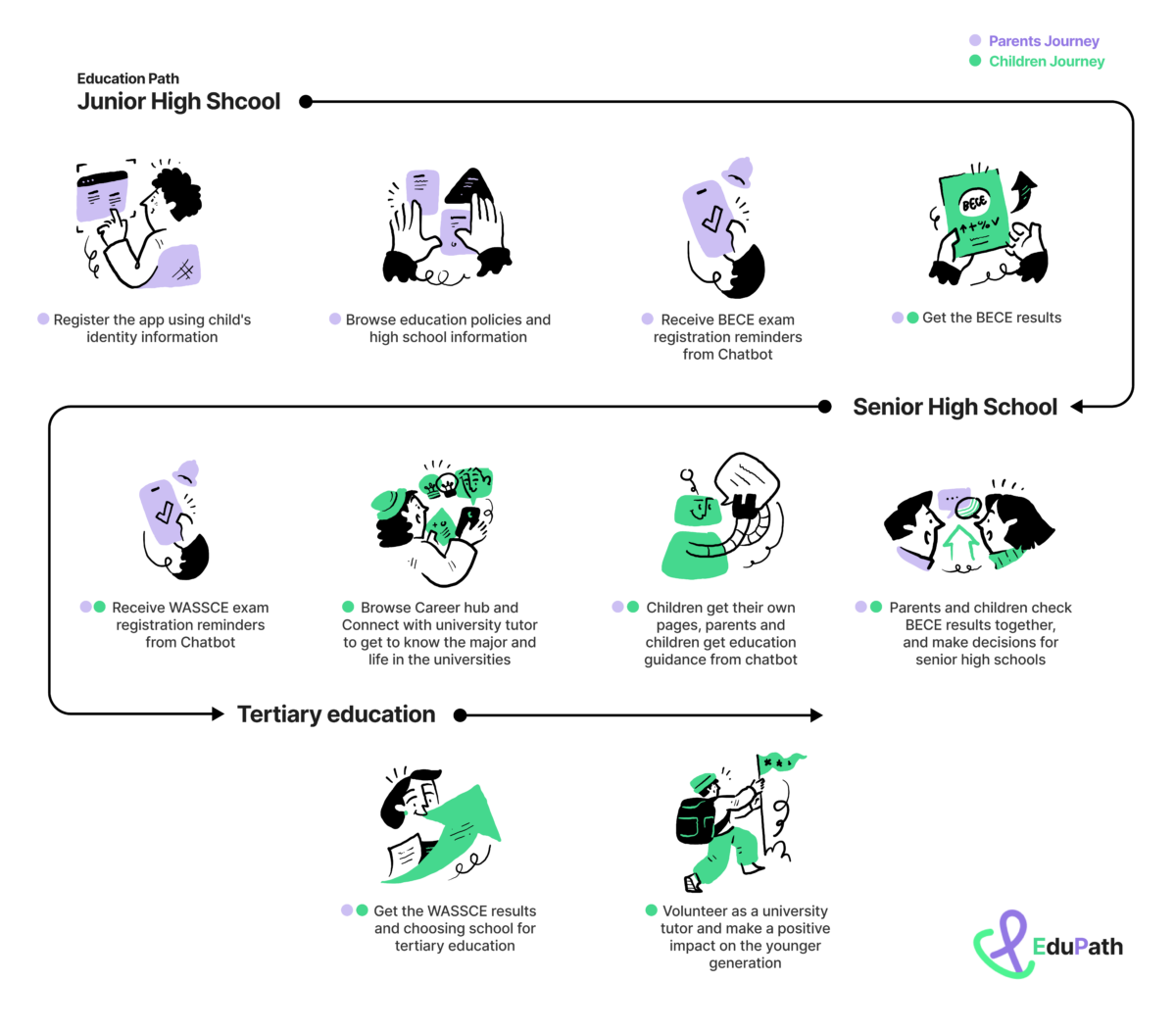
Figure 2. EduPath – Costumer Journey
How does EduPath work?
Once parents log in to the app with the student’s identity, they will receive real-time updates on the latest education news and policies directly on the app. Whether it’s guidance on Senior High School (SHS) selection or tips on SHS learning goals, could help households prepare for important decisions ahead.
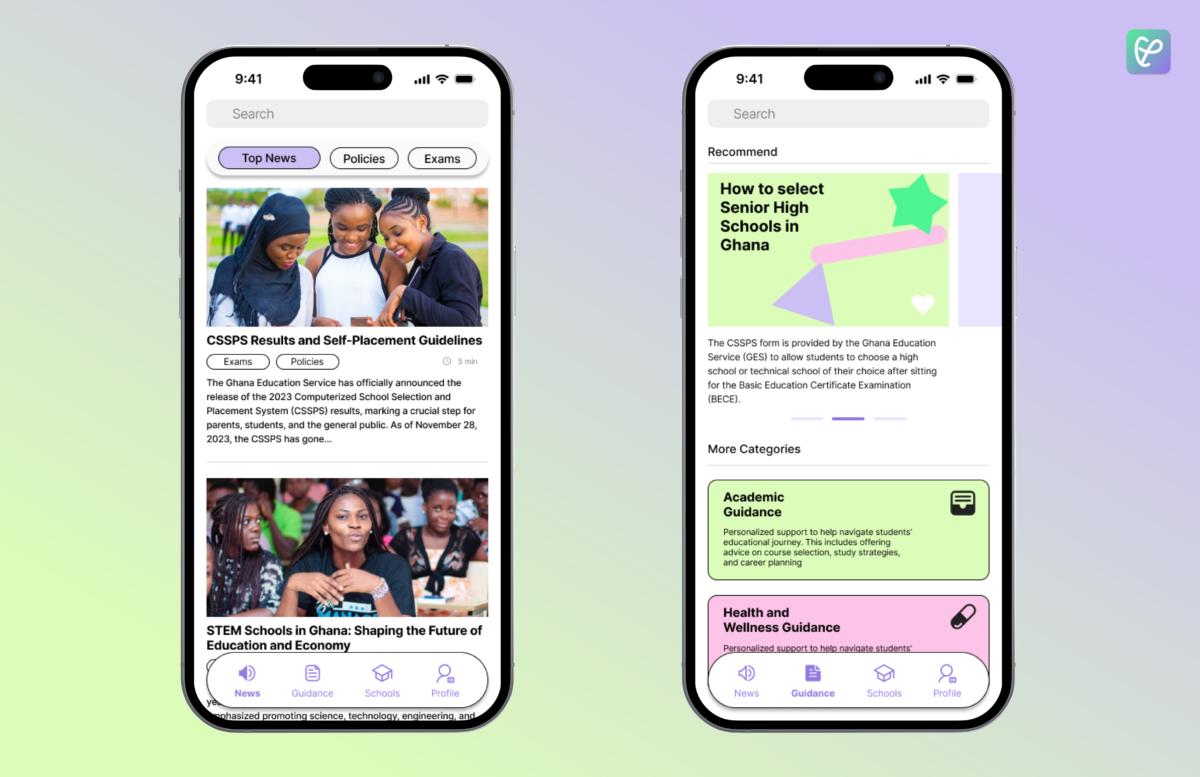
Figure 3. EduPath – News and Guidance
As students approach critical exams like the Basic Education Certificate Examination (BECE)1 and the West African Senior School Certificate Examination (WASSCE), the app will send notifications through a chatbot. Parents and students can use the school search function to explore suitable schools based on exam scores and other important considerations. This helps ensure the best possible match for the next phase of their education.
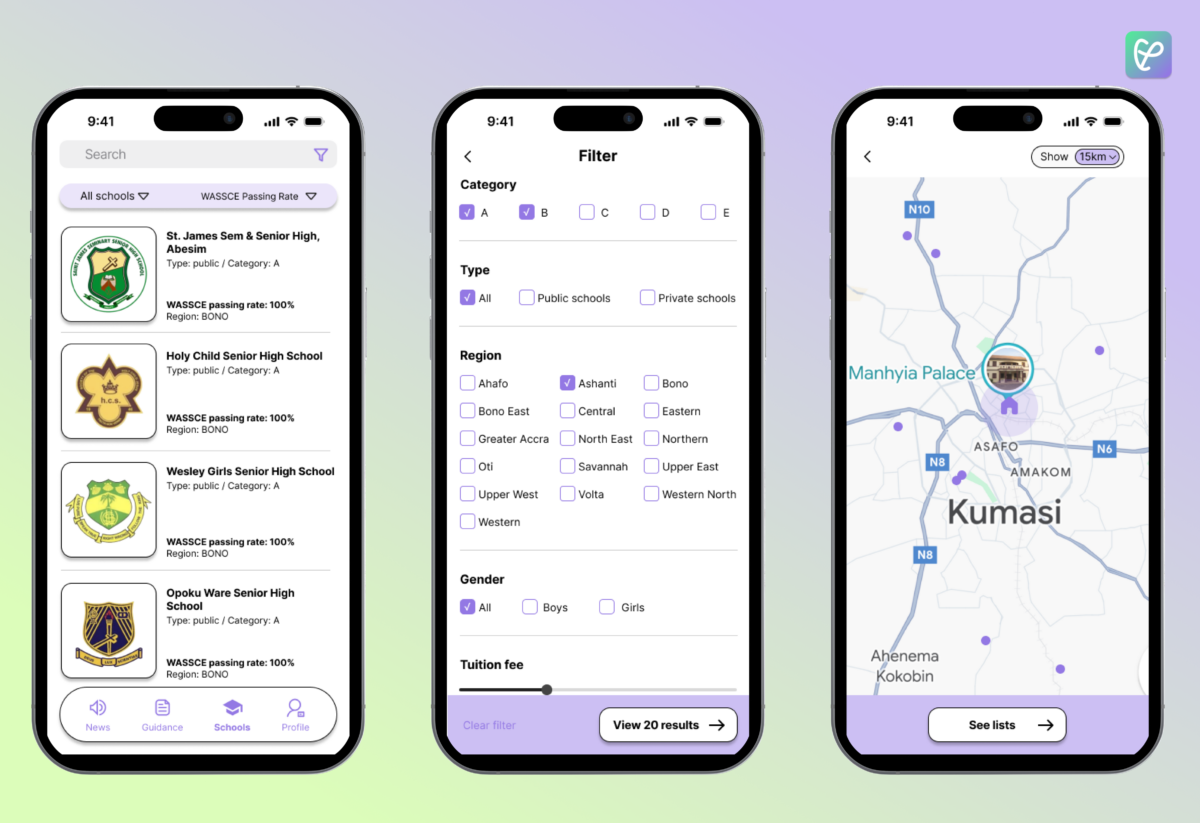
Figure 4. EduPath – Schools
Once students access their version of EduPath in Senior High School, they can explore the career hub to discover which schools are best suited to their ambitions. They can even connect with university volunteers for personalized advice on school selection and career development.
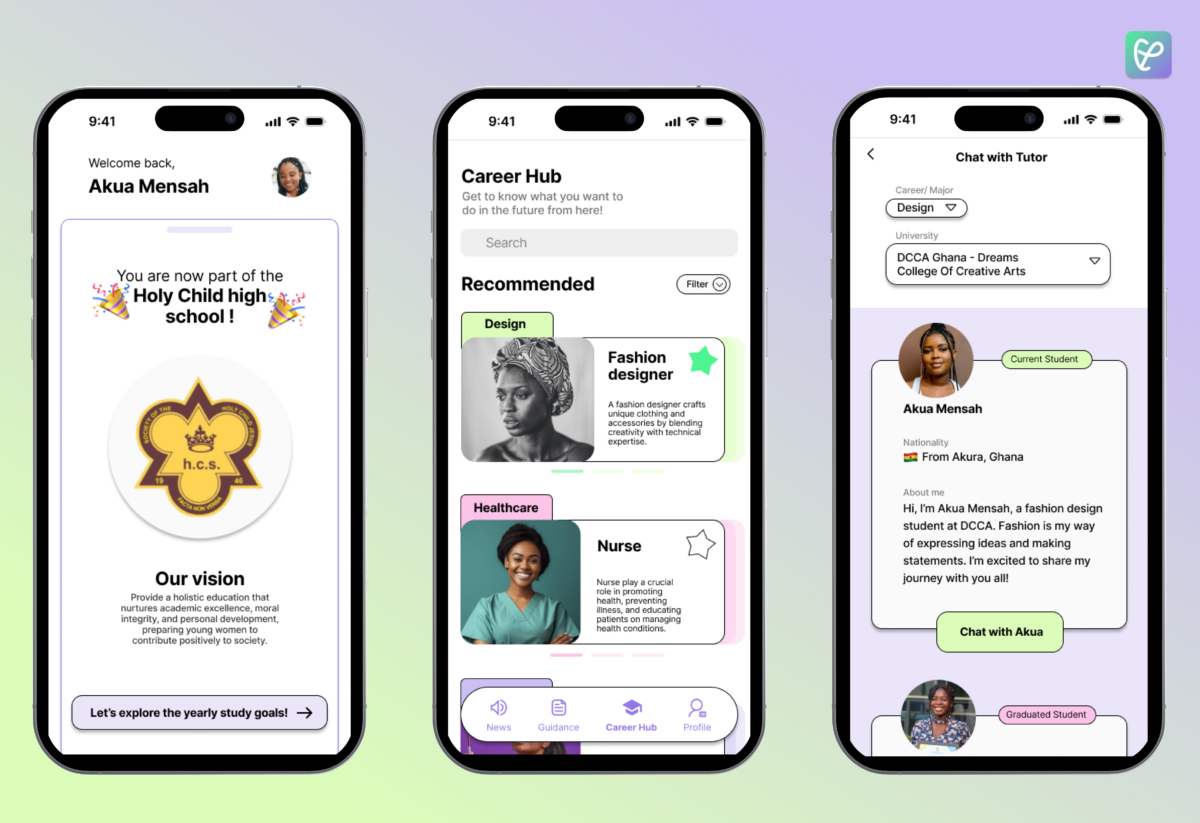
Figure 5. EduPath – Career hub
Video – EduPath
Business Model
Business Model
Our business model focuses on social impact by bridging the information gap in Ghana’s education system through an integrated platform for school information and selection services. The relationship with the client is mainly a phased online partnership, we work closely with the Ghana Statistical Service (GSS), the Ministry of Education, an AI support company, and local schools and families. Our primary funding sources are philanthropic foundations, government support, and alumni donations.
We maintain a strong partnership with the government to align our platform with national education goals. We plan to publish data-driven education reports to assist in policy-making and drive educational reforms. Alumni donations support the long-term sustainability of our project, ensuring we continue to enhance transparency and equity in Ghana’s education system.
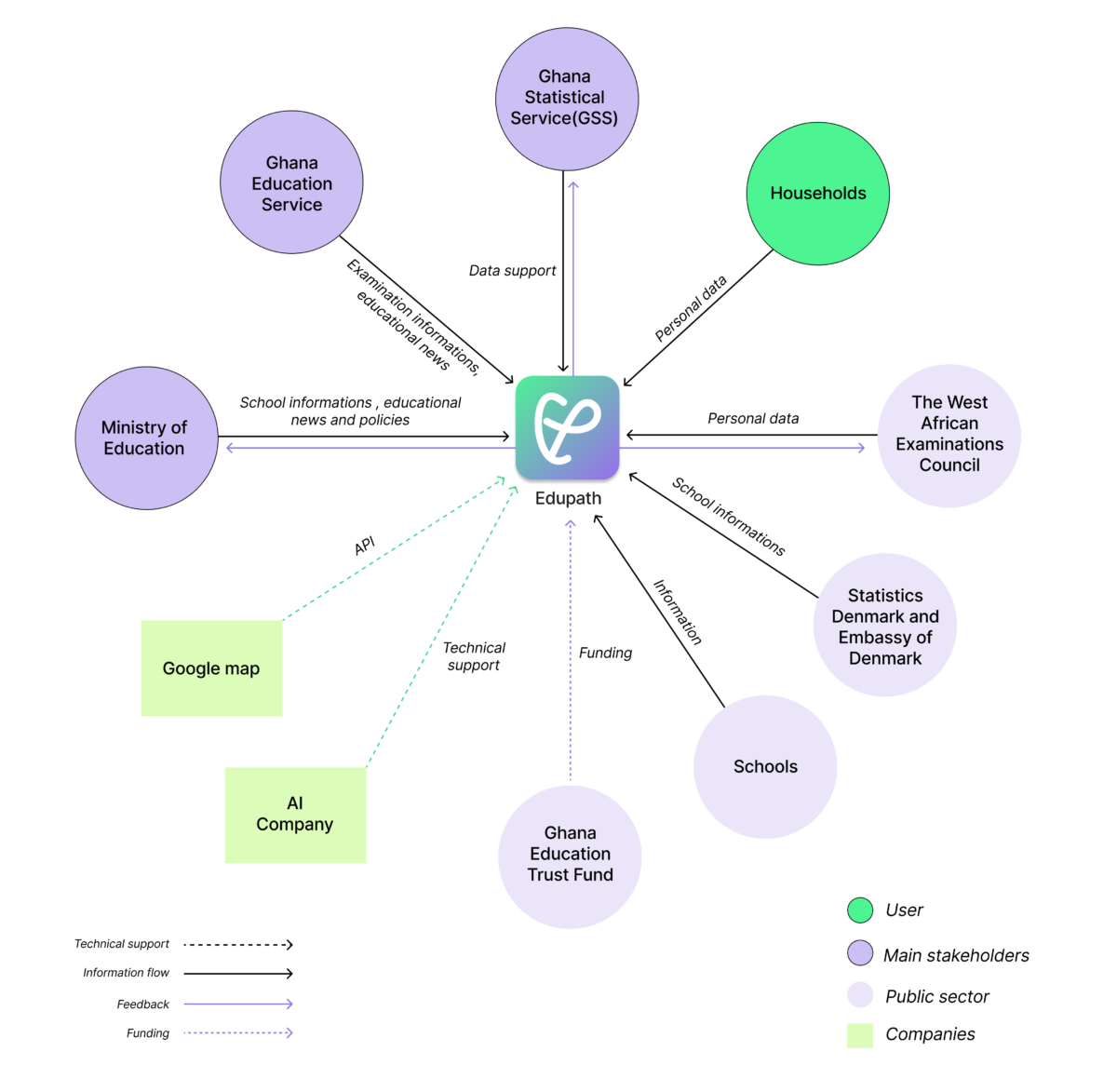
Implementation Plan
We plan to initiate pilot testing in the Ashanti, Oti, and Northern regions4. By continuously gathering feedback and refining our approach, we aim to establish a model that can be broadly applied. Once the model demonstrates its effectiveness, we will proceed with expanding the program to other regions.

Figure 7. Implementation Plan
Future Opportunities
Building on the education reforms initiated by the Government of Ghana under the Education Strategic Plan5, we see exciting future opportunities to improve access to education for all. Our focus will be on promoting educational equity, ensuring that every child, regardless of their background, has an equal opportunity to succeed. With the implementation of EduPath, we can make a significant impact on achieving Sustainable Development Goal 4 (SDG4) by providing inclusive and equitable quality education and promoting lifelong learning opportunities for all.
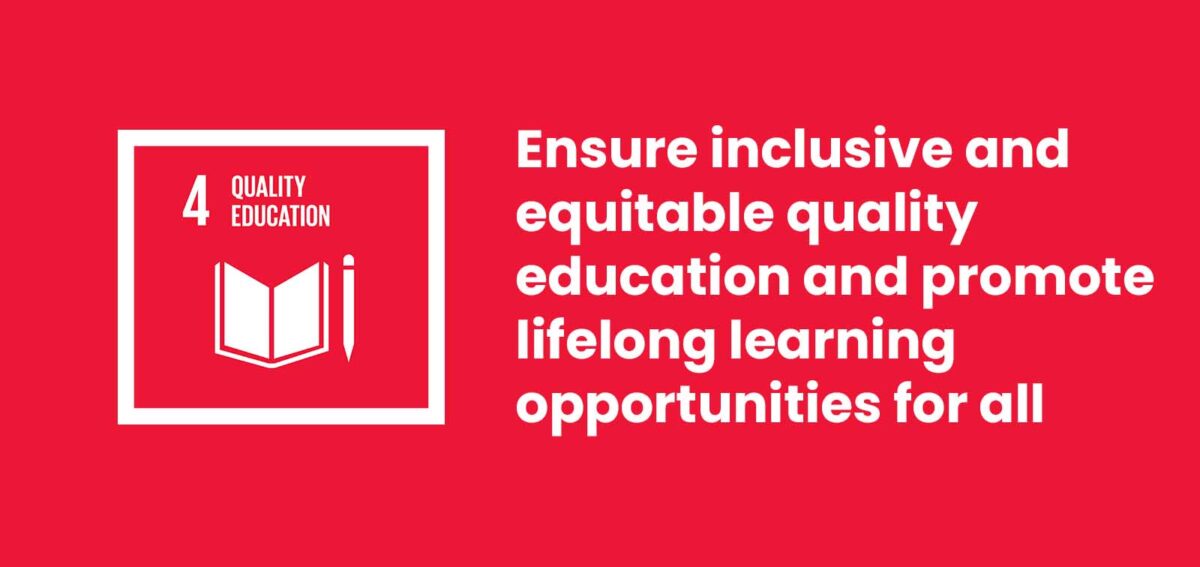
Supporting Students to Continue Education After Dropping Out
One of our key goals is to support students who have dropped out from schools. Our next step is to connect with stakeholders who can offer skill training, vocational schools, and other resources. After getting information and data support, our platform will feature real-time tracking of dropout cases, enabling timely support, offering everyone education choices to continue the educational journey.
Narrowing the education gap between urban and rural areas
In our efforts to make education accessible to everyone, we recognize that students in remote areas often lack access to mobile phones and personal computers. To address this, we plan to launch a web version of our platform tailored for use on public internet devices, such as those in school computer labs. Additionally, we aim to make our resources available in community settings and on other public digital devices, expanding opportunities for more people to access education.
These are the ways we’re expanding our platform’s reach and impact. We’re dedicated to ensuring that no student is left behind, and we believe these initiatives represent significant progress toward that goal. Stay tuned as we innovate and implement these plans, making education more accessible, inclusive, and empowering for everyone.
Meet Us



Jing Luo
Technical University of Denmark
Design and Innovation
Master’s Student
[email protected]
Find me on LinkedIn
Jianan Yang
Technical University of Denmark
Design and Innovation
Master’s Student
[email protected]
Find me on LinkdIn
Jiao Jiao
Technical University of Denmark
Design and Innovation
Master’s Student
[email protected]
Find me on LinkdIn
References
- National Examinations Council (neco.gov.ng) ↩︎
- Home – Ministry of Education Ghana (moe.gov.gh) ↩︎
- The West African Examinations Council – Committed to Excellence (waecgh.org) ↩︎
- Ghana Statistical Services. (statsghana.gov.gh) ↩︎
- Government of Ghana, Ministry of Education. (2018). Education Strategic Plan 2018-2030. Accra: Ministry of Education. ↩︎
